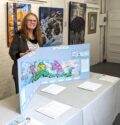Headline News
Provincially Significant Wetlands threatened by Province’s ‘abuse’ of MZOs
February 16, 2021

Feb. 16, 2021
By Nate Smelle
No matter what season it may be, Think Turtle Conservation Initiative’s founder and lead program director Kelly Wallace has her sights set on protecting turtles and the natural environment in Ontario. While during the winter she typically hosts public workshops and presentations to raise awareness of what can be done to reduce the impact of human activities threatening turtle populations, because of the COVID-19 pandemic Wallace has had more time to study provincial legislation, and how it is affecting species at risk.
By means of her investigation, Wallace discovered that since the pandemic took hold last year at this time, the Ford government has been using Minister’s Zoning Orders – a provision under the Ontario’s Planning Act to override protections for Provincially Significant Wetlands, municipal zoning and heritage designated buildings- at an “alarming rate.”
According to Wallace, in the past an MZO has been a rarely used “veto-like power” to over-rule local planning authority in cases of emergencies or to quickly advance an initiative of provincial significance. For instance, last October The Toronto Star reported that the previous Liberal government filed just two MZOs in 2016 and 2017. On the other end of the spectrum, while the public and the media was focused on preventing the spread of the pandemic throughout 2020, Wallace said the Ford government issued 33 new MZOs.
“There is considerable concern as the provincial government is thought to be abusing their powers to issue Minister’s Zoning Orders to clear the way for development that has other options available to it,” Wallace said.
“Most notable and damaging, an MZO was issued to demolish three Provincially Significant Wetlands on agriculturally zoned land in Vaughan, so that a Walmart distribution facility could be constructed. Following on that was a decision to destroy a large coastal PSW in the City of Pickering to make room for a warehousing facility, again through an MZO. Add to that five wetlands within the provincially significant East Humber River Wetland Complex in Vaughan.”
With more than 72 per cent of wetlands already destroyed in southern Ontario, Wallace sees pursuing alternative sites for development and industry as a necessity. Understanding how wetlands serve as hubs of biodiversity that provide natural habitat for a vast multitude of wildlife, including turtles, she is especially concerned about the current government’s increasing use of MZOs as a means to bypass legislation meant to protect the environment.
Acknowledging the essential role wetlands play in terms of public health and safety, she explained that “Wetlands are diverse ecosystems that give us clean and abundant water, control erosion, maintain stream flows, sequester carbon, nutrient recycling, disease prevention, provide a home to at least one third of all threatened and endangered species, reduce the effects of climate change.”
Explaining the value of these ecosystems in more detail, Wallace described how wetlands function as natural sponges, trapping and slowly releasing surface water, rain, snow-melt, groundwater and flood waters. She said it is this holding capacity of wetlands which helps control flooding and prevent waterlogging of crops.
“Wetlands are home to aquatic microbes, plants, insects, amphibians, reptiles, birds, fish and mammals, fish spawning grounds and nursery grounds, vital stop-overs for migrating birds and provide critical habitat for pollinators that in return they help producers by increasing crop production through increased pollination and contributing food resources for humans and species that depend on invertebrate prey,” Wallace said. “Upland wildlife like deer, elk and bears commonly use wetlands for food and shelter. There are many other services not listed.”
Wallace also drew attention to how wetlands create valuable economic contributions. Not only do these ecologically precious spaces deliver a range of educational opportunities, she said they also create jobs through ecotourism, and recreational activities like hunting, fishing and nature appreciation. Although it is difficult to put an exact value on the ecosystem services provided by wetlands, Wallace pointed out how the 2020 Ramsar Technical Report estimated the annual value of these services at $14-trillionUSD.
“It doesn’t matter where you reside in Ontario, or if you are a conservationist, birder, photographer, angler or hunter who loves the wetlands in some or all their forms be it marshes, swamps bogs or fens; or, you are a person who would never set foot in any wetlands, fact is they are vital to the health of our province,” Wallace said. “We depend on and benefit from the ecosystem services the wetlands provide. Wetlands are considered among the most productive ecosystems in the world, comparable to rain forests and coral reefs.”
Having come under fire for what many environmentalists are calling the “abuse” of the MZO, Minister of Municipal Affairs and Housing, Steve Clark defended the Ford government’s use of the legislation to delegates during the virtual Rural Ontario Municipal Association conference on Jan. 26.
Admitting that they have been accelerating “critical projects” by making Minister’s Zoning Orders, Clark said there were two things he wanted to make clear. First, he said every single MZO that the provincial government has made on non-provincial land has been at the request of the local municipality. Secondly, Clark maintained that the government’s commitment to protecting the Greenbelt “remains steadfast.” He also said that he is “not prepared to consider any MZOs or development within the Greenbelt.”

















